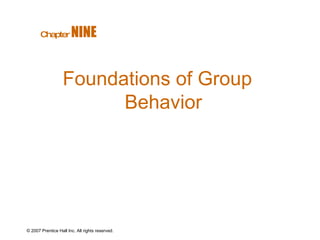More Related Content
Similar to Ob12 09st (20)
Ob12 09st
- 1. © 2007 Prentice Hall Inc. All rights reserved. Foundations of Group Behavior Chapter NINE
- 2. Defining and Classifying Groups © 2007 Prentice Hall Inc. All rights reserved. Group(s) Two or more individuals interacting and interdependent, who have come together to achieve particular objectives. Formal Group A designated work group defined by the organization’s structure. Informal Group A group that is neither formally structured nor organizationally determined; appears in response to the need for social contact.
- 3. Defining and Classifying Groups (cont’d) © 2007 Prentice Hall Inc. All rights reserved. Command Group A group composed of the individuals who report directly to a given manager. Task Group Those working together to complete a job or task. Interest Group Those working together to attain a specific objective with which each is concerned. Friendship Group Those brought together because they share one or more common characteristics.
- 5. The Five-Stage Model of Group Development © 2007 Prentice Hall Inc. All rights reserved. Forming Stage The first stage in group development, characterized by much uncertainty. Storming Stage The second stage in group development, characterized by intragroup conflict. Norming Stage The third stage in group development, characterized by close relationships and cohesiveness.
- 6. … Group Development (cont’d) © 2007 Prentice Hall Inc. All rights reserved. Performing Stage The fourth stage in group development, when the group is fully functional. Adjourning Stage The final stage in group development for temporary groups, characterized by concern with wrapping up activities rather than performance.
- 7. Stages of Group Development © 2007 Prentice Hall Inc. All rights reserved. E X H I B I T 9 –2
- 11. Group Properties - Roles © 2007 Prentice Hall Inc. All rights reserved. Role(s) A set of expected behavior patterns attributed to someone occupying a given position in a social unit. Role Identity Certain attitudes and behaviors consistent with a role. Role Perception An individual’s view of how he or she is supposed to act in a given situation.
- 12. Group Properties - Roles (cont’d) © 2007 Prentice Hall Inc. All rights reserved. Role Expectations How others believe a person should act in a given situation. Role Conflict A situation in which an individual is confronted by divergent role expectations. Psychological Contract An unwritten agreement that sets out what management expects from the employee and vice versa.
- 15. Group Properties - Norms (cont’d) © 2007 Prentice Hall Inc. All rights reserved. Conformity Adjusting one’s behavior to align with the norms of the group. Reference Groups Important groups to which individuals belong or hope to belong and with whose norms individuals are likely to conform. EXHIBIT 9 –4 ASCH STUDY
- 16. Group Properties - Norms (cont’d) © 2007 Prentice Hall Inc. All rights reserved. Deviant Workplace Behavior Antisocial actions by organizational members that intentionally violate established norms and result in negative consequences for the organization, its members, or both. Group norms can influence the presence of deviant behavior.
- 17. Typology of Deviant Workplace Behavior © 2007 Prentice Hall Inc. All rights reserved. E X H I B I T 9 –5 Category Examples Production Leaving early Intentionally working slowly Wasting resources Property Sabotage Lying about hours worked Stealing from the organization Political Showing favoritism Gossiping and spreading rumors Blaming coworkers Personal Aggression Sexual harassment Verbal abuse Stealing from coworkers Source: Adapted from S.L. Robinson, and R.J. Bennett. “A Typology of Deviant Workplace Behaviors: A Multidimensional Scaling Study,” Academy of Management Journal , April 1995, p. 565.
- 19. Group Properties - Status © 2007 Prentice Hall Inc. All rights reserved. Group Member Status Status: A socially defined position or rank given to groups or group members by others. Norms & Interaction Status Inequity National Culture Other things influencing or influenced by status Power over Others Ability to Contribute Personal Characteristics
- 22. Relationship Between Group Cohesiveness, Performance Norms, and Productivity © 2007 Prentice Hall Inc. All rights reserved. E X H I B I T 9-7
- 23. © 2007 Prentice Hall Inc. All rights reserved. E X H I B I T 9 –8 S. Adams, Build a Better Life by Stealing Office Supplies (Kansas City MO: Andrews & McMeal, 1991), p. 31. Dilbert reprinted with permission of United Features Syndicate, Inc.
- 26. Group Decision Making (cont’d) © 2007 Prentice Hall Inc. All rights reserved. Groupthink Phenomenon in which the norm for consensus overrides the realistic appraisal of alternative course of action. Groupshift A change in decision risk between the group’s decision and the individual decision that member within the group would make; can be either toward conservatism or greater risk.
- 28. Group Decision-Making Techniques © 2007 Prentice Hall Inc. All rights reserved. Interacting Groups Typical groups, in which the members interact with each other face-to-face. Nominal Group Technique A group decision-making method in which individual members meet face-to-face to pool their judgments in a systematic but independent fashion.
- 29. Group Decision-Making Techniques © 2007 Prentice Hall Inc. All rights reserved. Electronic Meeting A meeting in which members interact on computers, allowing for anonymity of comments and aggregation of votes. Brainstorming An idea-generation process that specifically encourages any and all alternatives, while withholding any criticism of those alternatives.
- 30. Evaluating Group Effectiveness © 2007 Prentice Hall Inc. All rights reserved. E X H I B I T 9 –9 TYPE OF GROUP Effectiveness Criteria Interacting Brainstorming Nominal Electronic Number and quality of ideas Low Moderate High High Social pressure High Low Moderate Low Money costs Low Low Low High Speed Moderate Moderate Moderate Moderate Task orientation Low High High High Potential for interpersonal conflict High Low Moderate Low Commitment to solution High Not applicable Moderate Moderate Development of High High Moderate Low group cohesiveness

